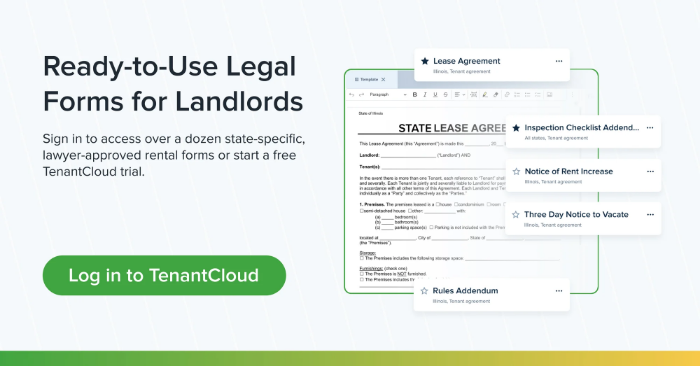 For busy landlords or property managers, getting to know Illinois eviction laws can be overwhelming. While every eviction process varies depending on the state and county of the rental property, the steps to eviction are generally the same. These steps include the following:
For busy landlords or property managers, getting to know Illinois eviction laws can be overwhelming. While every eviction process varies depending on the state and county of the rental property, the steps to eviction are generally the same. These steps include the following:
- Providing a written notice
- Filling out required forms
- Serving the tenant
- Attending the trial
- Final judgment
Keep in mind that your experience may vary depending on the terms in your lease/rental agreement. If you need help understanding the complexities of the eviction process, reach out to an attorney in Illinois.
This guide is a handy reference for anyone evicting a tenant in the Prairie State. We’ll go over important details like what to do if a tenant stops paying rent, how to give proper notice, reasons to evict, and more. Let’s get started.
Illinois Evictions: Reasons to Evict
An eviction is when a landlord removes a tenant from their rental property before their lease ends. While a landlord cannot evict without cause in the state of Illinois, they can initiate an eviction for the following reasons:
- Failure to Pay Rent
- Violation of the lease/rental agreement
- Participating in illegal activities
- Foreclosure or non-renewal of the lease

Now, let’s go over each common reason in greater detail.
1. Failing to Pay Rent
According to Illinois state law, a landlord or their agent can demand the rent payment and notify the tenant in writing any time after the rent is due. The notice must state that unless the rent is paid within a specific period (not less than five days after the notice), the tenant may be evicted.
If the tenant fails to pay within the specified period, the landlord can consider the lease ended and begin an eviction or ejectment action without further notice or demand. The landlord can also include a claim for the rent due in the complaint.
Partial Payment
A landlord can choose to continue the lease in exchange for partial payment, provided this agreement is made in writing. Any collection of past rent due after the filing of an eviction suit does not invalidate the suit.
2. Violating the lease agreement
It’s the landlord and tenant’s responsibility to adhere to the terms in the lease agreement signed at the start of their stay. Understanding the lease agreement (whether you’re a tenant or landlord) can save you time and hassle down the road, as there may be specific requirements that might not have been communicated otherwise. If a tenant violates the terms in the lease agreement, the landlord can issue a 10-day notice to either comply or quit. If the issues aren’t resolved, eviction can continue. Here are some examples of lease violations:
- Having unauthorized pets
- Damaging the property
- Smoking in non-smoking areas
- Noise complaints or neighbor disturbances
3. Illegal activities
If a tenant is involved with any illegal activities on the property, a landlord can provide a written 5-day notice. These behaviors can include theft, assault, substance abuse, robbery, etc. A landlord should take this involvement seriously and keep a close eye on the property to take care of the issue as early as possible.
4. Foreclosure or Non-renewal
If the landlord forecloses on their rental property, a landlord must let the tenants know via a 90-day written notice. If the tenant refuses to leave after 90 days, the landlord can continue the eviction. The same goes for a non-renewal lease. After the rental period is over, if the tenant has not moved out, a landlord must provide a written 7-day notice (for week-to-week leases), 30-day notice (month-to-month), or 60-day notice (yearly lease).
COVID-19 and Executive Order 2020-72
In response to the COVID-19 pandemic, Illinois Governor Pritzker issued Executive Order 2020-72, temporarily protecting tenants from eviction. During the period this order is in effect, landlords are prohibited from evicting anyone “covered.” This includes not being allowed to initiate any legal action or enforce any existing eviction.
The Legal Process of Eviction in Illinois
The eviction process in Illinois is governed by specific laws that all landlords must follow. It's important to understand these laws to ensure a fair and legal eviction process. Let's dive into these details.
Termination of Tenancy Before Eviction
Before starting the eviction process, landlords must first terminate the tenancy. The termination notice depends on the lease agreement and the reason for eviction. In Illinois, a written termination notice is required. This notice must contain a description of the leased premises, the reason for termination, and the termination date.
If you're a landlord, ensure you follow these steps precisely. If you're a tenant, know that you have rights during this process and may have time to resolve the issue before the eviction case is filed.
Different Types of Notices
There are different types of eviction notices in Illinois, and each serves a specific purpose.
- 5-Day Notice to Pay: This is given when a tenant fails to pay rent. If the tenant pays within five days, the eviction process halts. If not, the landlord can proceed with the eviction.
- 10-Day Notice to Comply or Quit: This notice is issued when a tenant violates the lease agreement. The tenant has ten days to resolve the violation and if they fail to do so, the landlord can proceed with the eviction.
- 5-Day Notice to Quit: This notice is given when a tenant engages in illegal activities within the rental property. If the tenant fails to vacate within five days, the eviction process continues.
- 90-Day Notice to Vacate: This notice is given when the rental property is under foreclosure. The tenant must vacate the property within 90 days.

1. Filing a Complaint
After a notice has been issued to the tenant, a landlord must file a complaint with the justice court where their rental is located. There most likely will be fees associated with these filings. When the complaints are filed, the tenant is then served.
2. Serving the Tenant
A court official serves the tenant with the documents within at least three days of the trial. A landlord cannot serve the tenant; it must be a sheriff, professional server, or otherwise authorized person. They may deliver the papers through mail, in person, or near the entrance in visible sight.
3. Going to Court
In Illinois, a tenant does not have to write a response in order for a court date to be scheduled. When the court date is set, both the landlord and tenant will have an opportunity to present their case with any evidence they have. If the tenant fails to show up to the trial, the landlord wins by default. If the landlord wins the case, a Writ of Execution will be issued.
4. Writ of Execution
A Writ of Execution gives the tenant a set amount of time (typically one to two weeks) to leave the property. If the tenant is being evicted due to illegal behavior, they typically only have seven days to vacate the property.
5. Tenant Moves Out
When the tenant receives the Writ, the tenant has a maximum of 14 days to move out. If the tenant does not move out within this time period, a sheriff or other authority can remove the tenant by force. A landlord cannot evict the tenant themselves.

Handling Abandoned Items After Eviction
After eviction, any property left by the tenant is considered abandoned. While Illinois state laws don’t specify what the landlord should do with these belongings, it’s advised that the landlord contacts the tenant with a reasonable timeframe to claim their items. It’s also common for landlords to store the belongings outside of the property so the tenants can retrieve the items at their leisure.
Tips for Landlords
Evictions can be time-consuming and emotionally draining. To help avoid these situations in the future, here are a few tips:
- Use a Lease Agreement: Make sure you and your tenants sign a lease agreement at the beginning of the lease to protect your rights. Your lease agreement should show the terms, when rent is due, and how rent is paid.
- Clearly Communicate: Keep records of all emails, texts, and letters to show records of communication. Respond to tenant requests promptly.
- Take Photos and Videos: If there is property damage or tenants are violating the lease agreement, these can be evidence in the trial and can help your case.
- Backup Documents: Keep your records and property details safely in a property management system or cloud storage system, as loose documents can get lost or stolen.

Tips for Tenants
Several resources are available for tenants facing eviction in Illinois. The Illinois Housing Development Authority offers a Rental Payment Program where landlords and housing providers can initiate a joint application for rental assistance. The Department of Human Services (DHS) also provides additional resources, including case management and legal assistance.
The Tenant’s Role in the Eviction Process
Tenants also have a role to play in the eviction process. Once they receive the eviction notice, they have the right and the opportunity to remedy the situation within the stipulated time frame. Whether by paying the overdue rent or rectifying a lease violation, tenants can prevent eviction if they act promptly.
If the tenant fails to comply, they must vacate the property within the notice period. If they refuse to leave, the landlord can continue with the eviction process.
Tenant Rights and Responsibilities
While the eviction process can be stressful for tenants, it's crucial to understand your rights and responsibilities. Tenants have the right to contest the eviction in court, and in some cases, they may have the opportunity to rectify the situation that led to the eviction notice during the notice period.
It's also important for tenants to understand that they cannot be forcibly evicted without a court order, and any attempt by the landlord to do so can result in legal penalties.
Conclusion
While Illinois state laws can be complicated, you're not alone in your journey. At TenantCloud, we're committed to helping you stay informed and compliant so you can focus on what matters most—providing a positive rental experience for your tenant.
As always, we recommend consulting a legal professional for advice tailored to your specific circumstances. Knowledge of the law combined with the right tools can make the property management process smoother and more successful.
Get Your Free TenantCloud Trial
Try our property management software free for 45 days and get the tools to manage rental payments, tenant screening, and reporting in a single, easy-to-use platform.



